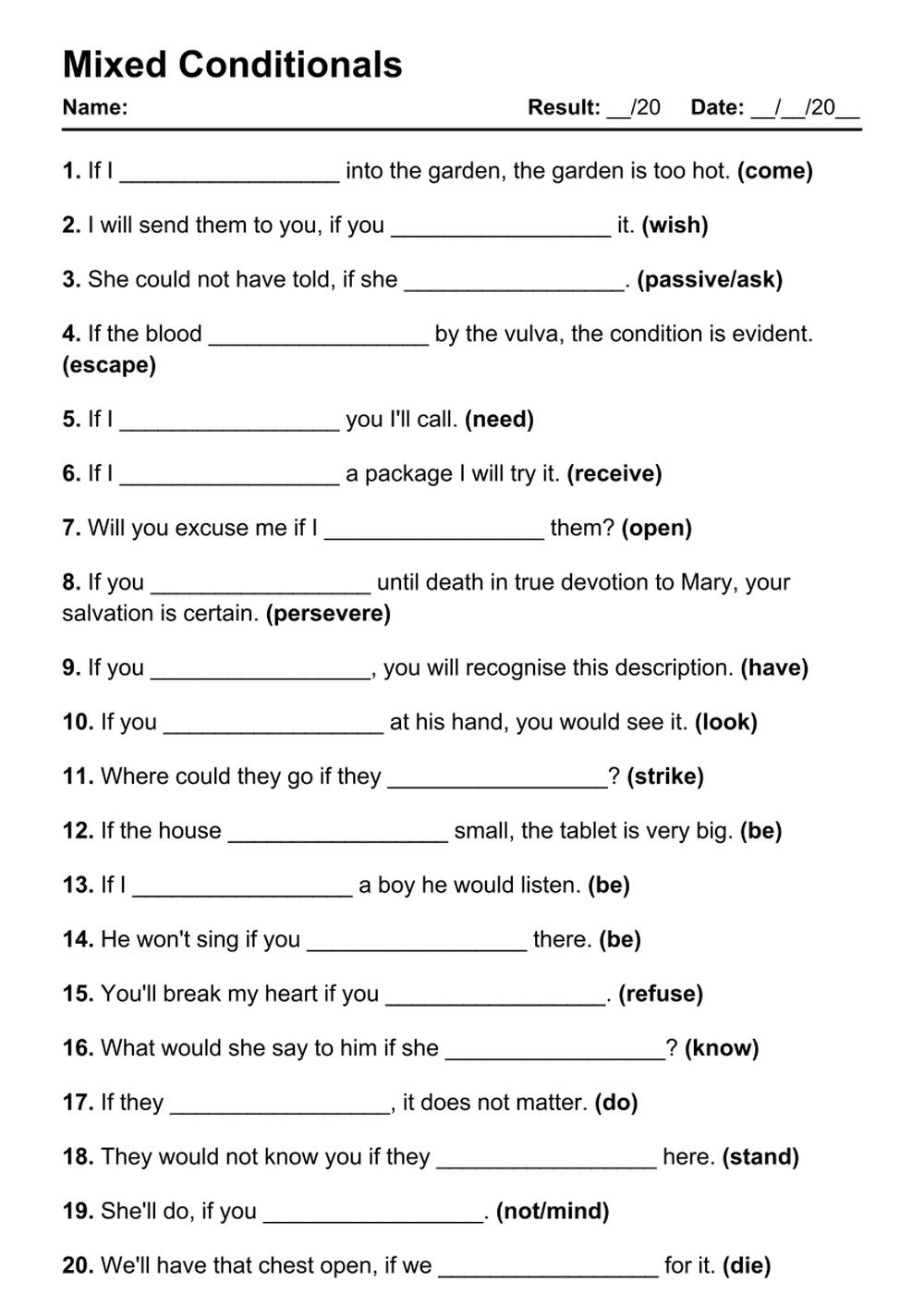Have you ever wondered how to express possibilities, hypothetical situations, or regrets in English? If so, then you’re not alone. Mastering conditional sentences is a crucial step in understanding the nuances of the English language, and it can dramatically enhance your communication skills. In this article, we’ll embark on a journey through the world of conditionals, explore their different types, and equip you with a comprehensive quiz to test your knowledge. Get ready to refine your grammar skills and become a confident communicator!

Image: www.grammarism.com
Conditional sentences, often referred to as “if…then” statements, are essential for expressing cause and effect, speculating about the future, and expressing hypothetical situations. They are used to describe the potential outcome of an event or action based on a specific condition. Understanding conditionals is critical for effectively conveying your thoughts and ideas in spoken and written English. Whether you are preparing for an exam, writing a compelling essay, or engaging in casual conversation, having a solid grasp of conditional sentences is a valuable asset.
Understanding the Building Blocks of Conditional Sentences
Conditional sentences are built upon a simple formula: “If + [condition] + then + [result].” The “if” clause introduces the condition, and the “then” clause outlines the consequence. While this basic structure might seem straightforward, there are variations in the tenses used in both clauses, and these variations represent different types of conditionals.
Types of Conditionals: Unraveling the Possibilities
There are four main types of conditionals in English, each with its own unique structure and meaning. Let’s delve into each type, gaining a deeper understanding of their application.
1. Zero Conditional: The Law of Nature
The zero conditional (also known as the “factual conditional”) describes situations that are always true, regardless of circumstances. It typically uses the present simple tense in both the “if” and “then” clauses.
Structure: If + present simple, + present simple
Example: If you heat water, it boils.

Image: www.pinterest.co.uk
2. First Conditional: Real Possibilities
The first conditional, also known as the “probable conditional,” focuses on real and likely possibilities in the future. It uses the present simple in the “if” clause and the future simple in the “then” clause.
Structure: If + present simple, + will/may/can + verb
Example: If you study hard, you will pass the exam.
3. Second Conditional: Imaginary Scenarios
The second conditional (also known as the “hypothetical conditional”) describes imaginary scenarios in the present or future, indicating a hypothetical situation that is unlikely to happen.
Structure: If + past simple, + would/could/might + verb
Example: If you were a millionaire, you would travel the world.
4. Third Conditional: Reflecting on the Past
The third conditional, also known as the “past conditional,” explores hypothetical situations in the past. It uses the past perfect in the “if” clause and would have + past participle in the “then” clause, to express a hypothetical outcome of a past situation.
Structure: If + past perfect, + would have + past participle
Example: If I had known you were coming, I would have prepared dinner.
Conditionals Quiz: Put Your Knowledge to the Test
Now that we’ve explored the basics of conditional sentences, let’s see how well you’ve grasped these concepts. This quiz will test your understanding of the different types of conditionals and their applications. The quiz is structured with various questions, ranging in difficulty, to challenge you and solidify your comprehension. Prepare to analyze each sentence, identify the correct conditional type, and put your grammatical skills to the test!
Instructions
Read each sentence carefully and choose the correct conditional type. Mark your answers in the answer key provided below. Once you’ve completed the quiz, compare your answers to the provided answer key to gauge your understanding. Remember, there is no shame in getting questions wrong. It is an opportunity for learning and growth!
Conditionals Quiz Questions
- If you eat too much, you’ll feel sick. (Zero, First, Second, Third)
- If we had left earlier, we wouldn’t have missed the train. (Zero, First, Second, Third)
- If you were a bird, where would you fly? (Zero, First, Second, Third)
- If it rains, the game will be postponed. (Zero, First, Second, Third)
- If you study hard, you will succeed. (Zero, First, Second, Third)
- If I won the lottery, I would quit my job. (Zero, First, Second, Third)
- If you mix red and yellow, you get orange. (Zero, First, Second, Third)
- If I had known you were coming, I would have baked a cake. (Zero, First, Second, Third)
- If she asks for help, they will assist her. (Zero, First, Second, Third)
- If you boil water, it turns to steam. (Zero, First, Second, Third)
Answer Key
Use this Answer Key to compare your answers and assess your understanding.
- Question 1: First
- Question 2: Third
- Question 3: Second
- Question 4: First
- Question 5: First
- Question 6: Second
- Question 7: Zero
- Question 8: Third
- Question 9: First
- Question 10: Zero
Conditionals Quiz With Answers + Pdf
Boosting Your Conditional Skills: Take Your Knowledge to the Next Level
Congratulations! By completing the quiz, you have taken a significant step in mastering conditional sentences. But the journey doesn’t end here. For those who are eager to further refine their understanding and become fluent in this area of grammar, we recommend exploring a variety of resources. These resources can provide additional practice exercises, detailed explanations, and real-life examples, helping you to solidify your conditional mastery.
Now that you have a stronger grasp of conditional sentences, you’ll be able to express a wider range of ideas, opinions, and possibilities with greater clarity and precision. Remember to keep practicing, engaging in conversations, and continually challenging yourself to expand your grammatical knowledge. Soon, you’ll be able to navigate the complexities of conditionals with ease and confidence, effectively communicating your thoughts and ideas in any situation.




